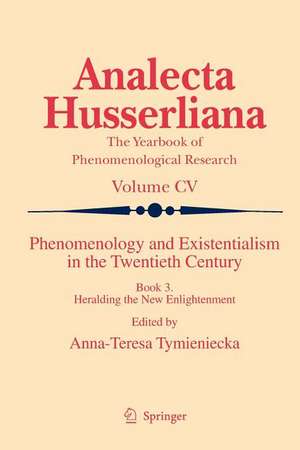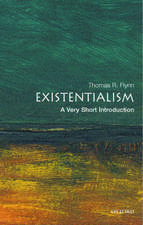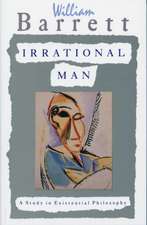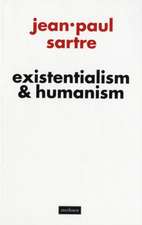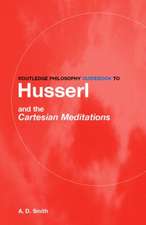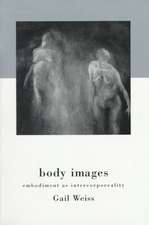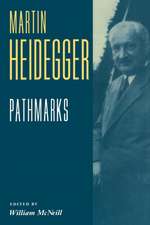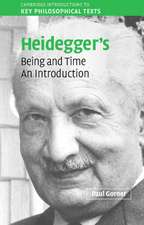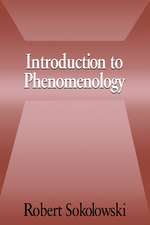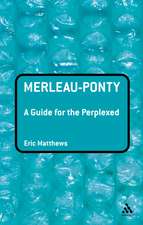Phenomenology and Existentialism in the Twenthieth Century: Book III. Heralding the New Enlightenment: Analecta Husserliana, cartea 105
Editat de Anna-Teresa Tymienieckaen Limba Engleză Paperback – 7 sep 2012
| Toate formatele și edițiile | Preț | Express |
|---|---|---|
| Paperback (1) | 1222.01 lei 43-57 zile | |
| SPRINGER NETHERLANDS – 7 sep 2012 | 1222.01 lei 43-57 zile | |
| Hardback (1) | 1228.15 lei 43-57 zile | |
| SPRINGER NETHERLANDS – 10 iul 2010 | 1228.15 lei 43-57 zile |
Din seria Analecta Husserliana
- 17%
 Preț: 524.10 lei
Preț: 524.10 lei - 24%
 Preț: 814.98 lei
Preț: 814.98 lei - 20%
 Preț: 570.72 lei
Preț: 570.72 lei - 15%
 Preț: 643.00 lei
Preț: 643.00 lei - 18%
 Preț: 2098.96 lei
Preț: 2098.96 lei - 15%
 Preț: 636.12 lei
Preț: 636.12 lei - 15%
 Preț: 643.84 lei
Preț: 643.84 lei - 18%
 Preț: 952.57 lei
Preț: 952.57 lei - 18%
 Preț: 950.52 lei
Preț: 950.52 lei - 15%
 Preț: 642.18 lei
Preț: 642.18 lei - 24%
 Preț: 1072.12 lei
Preț: 1072.12 lei - 18%
 Preț: 947.67 lei
Preț: 947.67 lei - 18%
 Preț: 1225.94 lei
Preț: 1225.94 lei - 24%
 Preț: 1075.48 lei
Preț: 1075.48 lei - 18%
 Preț: 949.73 lei
Preț: 949.73 lei - 15%
 Preț: 647.59 lei
Preț: 647.59 lei - 20%
 Preț: 577.73 lei
Preț: 577.73 lei -
 Preț: 386.22 lei
Preț: 386.22 lei - 15%
 Preț: 651.19 lei
Preț: 651.19 lei - 18%
 Preț: 960.42 lei
Preț: 960.42 lei -
 Preț: 390.08 lei
Preț: 390.08 lei - 18%
 Preț: 1128.89 lei
Preț: 1128.89 lei
Preț: 1222.01 lei
Preț vechi: 1490.25 lei
-18% Nou
Puncte Express: 1833
Preț estimativ în valută:
233.83€ • 244.76$ • 194.62£
233.83€ • 244.76$ • 194.62£
Carte tipărită la comandă
Livrare economică 31 martie-14 aprilie
Preluare comenzi: 021 569.72.76
Specificații
ISBN-13: 9789400732643
ISBN-10: 9400732643
Pagini: 404
Ilustrații: IX, 394 p.
Dimensiuni: 155 x 235 x 21 mm
Greutate: 0.57 kg
Ediția:2010
Editura: SPRINGER NETHERLANDS
Colecția Springer
Seria Analecta Husserliana
Locul publicării:Dordrecht, Netherlands
ISBN-10: 9400732643
Pagini: 404
Ilustrații: IX, 394 p.
Dimensiuni: 155 x 235 x 21 mm
Greutate: 0.57 kg
Ediția:2010
Editura: SPRINGER NETHERLANDS
Colecția Springer
Seria Analecta Husserliana
Locul publicării:Dordrecht, Netherlands
Public țintă
ResearchCuprins
Theme.- Heralding the New Enlightenment.- Inaugural Lecture.- The New Enlightenment.- Section I.- The Development of the Living Seed of Intentionality. From E. Husserl and E. Fink to A.-T. Tymieniecka’s Ontopoiesis of Life.- Phenomenology in a New Century: What Still Needs to be Done.- Tymieniecka’s First Philosophy.- Jean Wahl And The Renewal Of Metaphysics.- Section II.- Post-Modernism and the Ethics of Conscience: Various “Interpretations” of the Morality of the Post-Modern World. Role of A. T. Tymieniecka’s Phenomenology of Life.- On the Meaningfulness of Man’s Existence: from the Existentialist Thinking to Phenomenology of Life.- Creative Imagination In Harmony as Full Maturity Of Phenomenological Inquiry.- Hermeneutics and the Vocative Structure of the Divine: Toward a Dramatic, Redemptive Phenomenology.- Arriving in the World-of-Life.- Section III.- Intersubjectivity– an Existentialistic, Phenomenological and Discourse Ethical Approach.- Is the Phenomenon of Non-Intentional “Self-Other”? Relation Possible?.- Two Dimensions Of Human Being In Karl Jaspers’ Philosophy– Existence And Hermeneutics.- The Guilt Which We Are: An Ontological Approach To Jaspers’ Idea Of Guilt.- Section IV.- Freud, Husserl And “Loss Of Reality ” : Classical Psychoanalysis, Transcendental Phenomenology And Explication Of Psychosis.- A Contribution To Phenomenology Of The Human Normality In The Modern Time.- Toward A Phenomenological And Existential Psychology.- Paradoxes Of Intention: Logotherapy, Phenomenology And Existentialism.- Section V.- Phenomenology Of Utilitarian-Aesthetic Dynamics Of Nature.- Human Flourishing Beyond Economic Well-Being: The Contribution Of Phenomenology Towards A “Richer” ?Idea Of Personhood.- Section VI.- PhenomenologicalPerspectives On Philosophical Didactics.- Phenomenology Of Education: Contemporary Dialogue Of Philosophy And Pedagogics.- Concluding.- The Phenomenological Way: A Philosophical View On The Vitality Of Being.
Textul de pe ultima copertă
The great flourishing in the Twentieth Century of the amalgamated movement of Phenomenology and Existentialism, having reached its unfolding and reverberation – as we have shown in our two preceding books and continue in this one – seems to have spanned the entire gamut of their marvels.
Although the philosophical field is being still corroborated by phenomenologico-existential insights, their approaches and tendencies in a constant flux of perspectives, phenomenology as such has remained itself an open question. Its ultimate foundations, the question of "phenomenology of phenomenology", its "unconditional positioning" as the source of sense has not been solved by Husserl (see herein Verducci’s study of Husserl and Fink, infra-page).
But in this conundrum in which we find ourselves, there is gathering a wave of thought that continues regenerating philosophy. The deepest phenomenologico-existential inspirations, driven by a prompting logos, is undertaking a new critique of reason (see Verducci), apprehending the pivotal role of Imaginatio Creatrix (see Egbe), realizing Jean Wahl’s importance as an early precursor of the quest after ultimate meaning (see Kremer-Marietti) and is clarifying the Logos of the "Moral Sense" (see Cozma and Szmyd). Finding a new point of departure for all phenomenology in the ontopoiesis of life (Tymieniecka) and so establishing the sought for "first philosophy" encompassing all (see Haney), is fructifying the coalescing reformulations of issues found in the phenomenology/ontopoiesis of life. We have here a powerful ferment we may call the New Enlightenment.
Although the philosophical field is being still corroborated by phenomenologico-existential insights, their approaches and tendencies in a constant flux of perspectives, phenomenology as such has remained itself an open question. Its ultimate foundations, the question of "phenomenology of phenomenology", its "unconditional positioning" as the source of sense has not been solved by Husserl (see herein Verducci’s study of Husserl and Fink, infra-page).
But in this conundrum in which we find ourselves, there is gathering a wave of thought that continues regenerating philosophy. The deepest phenomenologico-existential inspirations, driven by a prompting logos, is undertaking a new critique of reason (see Verducci), apprehending the pivotal role of Imaginatio Creatrix (see Egbe), realizing Jean Wahl’s importance as an early precursor of the quest after ultimate meaning (see Kremer-Marietti) and is clarifying the Logos of the "Moral Sense" (see Cozma and Szmyd). Finding a new point of departure for all phenomenology in the ontopoiesis of life (Tymieniecka) and so establishing the sought for "first philosophy" encompassing all (see Haney), is fructifying the coalescing reformulations of issues found in the phenomenology/ontopoiesis of life. We have here a powerful ferment we may call the New Enlightenment.
Caracteristici
Presents the third phase of the unfolded and disseminated flux of phenomenology and existentialism which did transform our culture Its powerful inspirations are spent, without answering the crucial questions with the self-validation of phenomenology which Husserl failed to answer By retrieving its originary sense in the subjacent ontopoiesis of life, of becoming, of reason, we witness the novel upsurge of phenomenological spirit inaugurating the New Enlightenment
